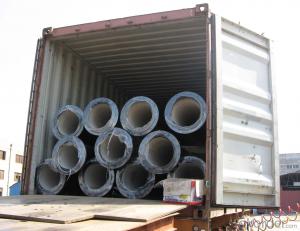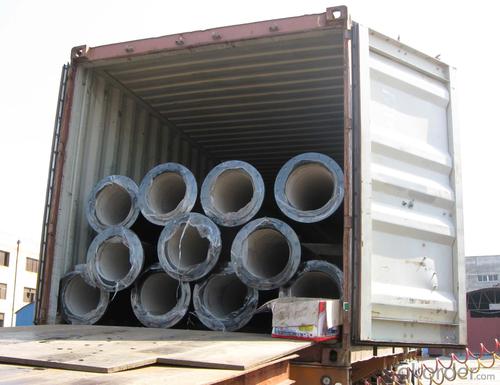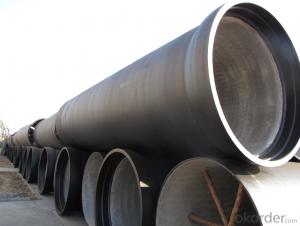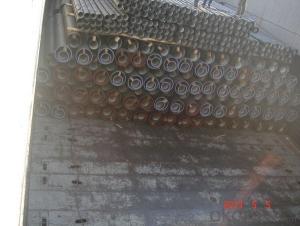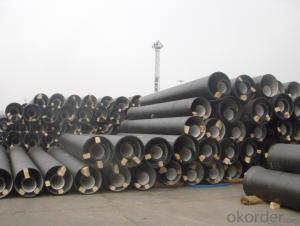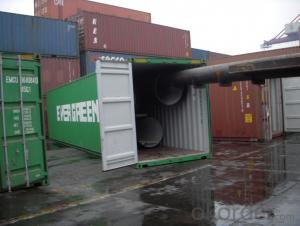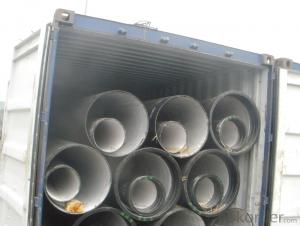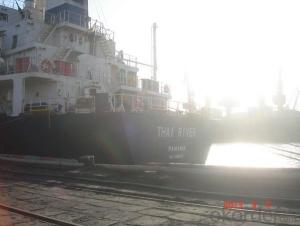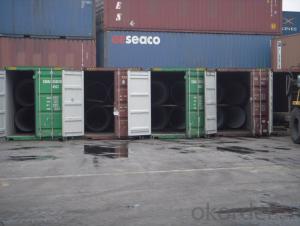DUCTILE IRON PIPES AND PIPE FITTINGS C CLASS DN1300
- Loading Port:
- Tianjin
- Payment Terms:
- TT OR LC
- Min Order Qty:
- 22 m.t
- Supply Capability:
- 30000 m.t/month
OKorder Service Pledge
OKorder Financial Service
You Might Also Like
Material : Ductile Cast Iron
Size Range : DN 80mm to DN 2000mm
Unit Effective Length : 6m or 5.7m
Manufacture Standard: ISO 2531:1998/ EN 545:2006/EN 598:2007
Annual capacity : 200,000 tons
Coating Exterior: Zinc 130g/m2 according to ISO 8179-1 and bitumen coating 70 microns.
Cement Interior: Portland Cement/ High Alumina Cement/ Sulphate Resisting Cement Lining according to ISO 4179
Special requirements on external coating and internal lining can be applied
We also provide accessories such as SBR/EPDM rubber gaskets, lubricant paste, pipe caps, PE sleeves, etc.
Additional Parts:
Each pipe is strictly inspected according to related standard to ensure permanently high performance.
Easy Installation at site and service free for life
Long Service Lifespan
Quotation will arrive you within 24hours once we get your inquiry.
We guarantee offering you a competitive price.
A copy of original inspection reports of pipes will be offered after shipment.
Photos of loading process will be sent to the customer after shipment effect.
We will follow-up the delivery progress after shipment effect and update to the customer on weekly basis.
- Q: Are ductile iron pipes suitable for potable water distribution systems?
- Ductile iron pipes are well-suited for the distribution of drinking water in potable water systems. Ductile iron, a form of cast iron, is renowned for its strength and durability, making it an ideal choice for transporting drinking water. These pipes possess corrosion resistance, a crucial factor in preserving the safety and quality of potable water. Moreover, their smooth inner surface helps prevent the accumulation of sediments and biofilms that can negatively impact water quality. Furthermore, they can withstand high pressure and temperature fluctuations, rendering them suitable for diverse potable water distribution systems. In summary, ductile iron pipes are a dependable and widely employed solution for ensuring the provision of safe and uncontaminated drinking water to communities.
- Q: How does ductile iron pipe perform in high-pressure gas applications?
- Ductile iron pipe is an excellent choice for high-pressure gas applications due to its unique characteristics and properties. Firstly, ductile iron pipe is known for its high tensile strength, which allows it to withstand the high pressure exerted by gas flowing through the pipeline. This strength ensures that the pipe can safely contain the gas without any leakage or rupture. Moreover, ductile iron pipe has a high resistance to corrosion, making it suitable for gas applications where the pipeline may come into contact with moisture, chemicals, or other corrosive substances. This resistance to corrosion ensures the longevity of the pipe and minimizes the risk of any damages or failures that could be caused by corrosion. Another advantage of ductile iron pipe in high-pressure gas applications is its ability to handle thermal expansion and contraction. When gas is transported at high pressures, there can be significant temperature variations, leading to expansion and contraction of the pipeline. Ductile iron pipe's flexibility allows it to accommodate these changes without causing any structural issues or compromising its performance. Furthermore, ductile iron pipe has a smooth interior surface, which reduces friction losses and pressure drops, allowing for efficient gas flow. This smoothness also minimizes the chances of gas impurities or debris getting trapped, which could potentially cause blockages or flow disruptions. In summary, ductile iron pipe is a reliable and durable choice for high-pressure gas applications. Its high tensile strength, corrosion resistance, ability to handle thermal expansion, and smooth interior surface all contribute to its excellent performance in such demanding conditions.
- Q: What is the expected thermal expansion coefficient of ductile iron pipes?
- The expected thermal expansion coefficient of ductile iron pipes typically ranges from 10.8 to 12.2 x 10^-6 per degree Celsius.
- Q: What is ductile iron pipe?
- Ductile cast iron is defined using the above number 18 by adding nodulizer, after centrifugal ductile cast iron machine centrifugal cast pipe, ductile iron pipe (called [span]Ductile Cast Iron Pipes), referred to as ball pipe, ductile iron pipe and ductile iron pipe etc..
- Q: Are ductile iron pipes suitable for acidic or alkaline environments?
- Ductile iron pipes are generally suitable for both acidic and alkaline environments, although their performance may vary depending on the specific conditions. Ductile iron is a type of cast iron that has been treated with a small amount of magnesium to enhance its strength and flexibility. This treatment allows ductile iron pipes to withstand a wide range of conditions, including those found in acidic or alkaline environments. In acidic environments, ductile iron pipes provide good resistance to corrosion. The iron in the pipes reacts with the acid to form a protective layer of iron oxide, which helps prevent further corrosion. However, it is important to note that the performance of ductile iron pipes in acidic environments can be influenced by factors such as the concentration of the acid and the temperature. In highly concentrated or extremely acidic conditions, alternative materials like stainless steel or corrosion-resistant alloys may be more suitable. Similarly, in alkaline environments, ductile iron pipes exhibit good resistance to corrosion. The alkaline conditions in these environments typically help to passivate the surface of the iron, forming a protective layer that prevents further corrosion. However, as in acidic environments, the specific conditions and concentrations of alkalis may impact the performance of ductile iron pipes. In cases of very high alkalinity or extreme temperatures, other materials like plastic or concrete pipes may be more appropriate. It is worth noting that although ductile iron pipes are generally suitable for both acidic and alkaline environments, regular maintenance and monitoring are crucial to ensure their long-term performance. Proper attention should be given to monitoring the pH levels and other chemical characteristics of the environment to identify any potential issues or required maintenance. Consulting with experts or engineers in the field can provide valuable insights and guidance in selecting the most appropriate materials for specific acidic or alkaline environments.
- Q: Are there any special considerations for installing ductile iron pipe in rocky soils?
- Installing ductile iron pipe in rocky soils presents various special considerations. First and foremost, the excavation process can be a challenge due to the presence of rocks. Trenching becomes more difficult and time-consuming, requiring specialized equipment to break through the rocks and create a suitable trench for the pipe installation. Furthermore, the rocky soil can cause abrasion and damage to the outer surface of the ductile iron pipe during installation. This poses a potential risk to the integrity of the pipe, leading to leaks or breakages in the future. To mitigate this risk, it is advisable to utilize protective measures such as rock shields or padding around the pipe, minimizing direct contact with the rocks. In addition, the presence of rocks can impact the backfilling process. Proper backfilling is essential to provide support and stability to the installed pipe. However, rocks can hinder the proper compaction of the backfill material, resulting in uneven support and potential movement of the pipe. Therefore, it is crucial to carefully select and place the backfill material, ensuring it is free from larger rocks and adequately compacted to provide sufficient support. Moreover, the rocky soil can also affect the installation of fittings and joints. The hardness of the rocks can make it challenging to align and connect the pipe with fittings or create secure joints. Therefore, extra care must be taken during the installation process to ensure proper alignment and secure connections, preventing leaks and ensuring the long-term functionality of the ductile iron pipe system. In conclusion, installing ductile iron pipe in rocky soils demands special attention to overcome challenges related to excavation, abrasion, backfilling, and fitting installation. By taking these factors into account and implementing appropriate measures, the installation process can be carried out successfully, allowing the pipe system to operate effectively even in rocky soil conditions.
- Q: Are ductile iron pipes suitable for underground parking structures?
- Yes, ductile iron pipes are suitable for underground parking structures. They are strong, durable, and resistant to external pressures, making them ideal for use in underground environments where they can withstand heavy loads and potential ground movements. Additionally, ductile iron pipes have excellent corrosion resistance, ensuring long-term performance and minimal maintenance in underground parking structures.
- Q: What is ductile iron?
- Ductile iron is a type of cast iron that has been treated with magnesium or cerium to improve its mechanical properties. It is called "ductile" because it has a higher degree of ductility compared to other types of cast iron. Ductility refers to the ability of a material to be stretched or deformed without breaking. This characteristic makes ductile iron highly suitable for applications that require high strength and resistance to wear and tear, such as pipes, automotive components, and machinery parts. The addition of magnesium or cerium to the iron during the manufacturing process helps to form graphite in the structure, which gives ductile iron its unique properties. This graphite formation also helps to make the iron more flexible and less brittle, enabling it to absorb shock and vibration without fracturing. Overall, ductile iron offers a balance between the strength of cast iron and the flexibility of steel, making it a versatile material for various industrial applications.
- Q: Can ductile iron pipes be used for firefighting systems?
- Yes, ductile iron pipes can be used for firefighting systems. Ductile iron is a strong and durable material that can withstand high pressures and extreme temperatures, making it suitable for transporting water in firefighting systems. Its ability to resist corrosion and withstand external loads also ensures the long-term reliability and performance of the pipes. Additionally, ductile iron pipes have excellent fire resistance properties, as they do not burn, emit toxic fumes, or contribute to the spread of fire. Therefore, ductile iron pipes are a reliable and commonly used choice for firefighting systems due to their strength, durability, and fire resistance.
- Q: What is the weight of a typical ductile iron pipe?
- The weight of a typical ductile iron pipe can vary depending on size and wall thickness. Ductile iron pipes are generally available in sizes ranging from 3 inches to 64 inches in diameter. The weight of these pipes can range from a few pounds per foot for smaller sizes to several hundred pounds per foot for larger diameters. Additionally, wall thickness plays a significant role in determining the weight of the pipe. Thicker walls will result in a heavier pipe. For example, a 10-inch ductile iron pipe with a wall thickness of 0.25 inches may weigh around 26 pounds per foot, while a 24-inch ductile iron pipe with a wall thickness of 0.5 inches can weigh approximately 175 pounds per foot. To determine the precise weight of a specific ductile iron pipe, it is essential to consult specific manufacturer specifications or engineering references.
Send your message to us
DUCTILE IRON PIPES AND PIPE FITTINGS C CLASS DN1300
- Loading Port:
- Tianjin
- Payment Terms:
- TT OR LC
- Min Order Qty:
- 22 m.t
- Supply Capability:
- 30000 m.t/month
OKorder Service Pledge
OKorder Financial Service
Similar products
Hot products
Hot Searches
Related keywords
